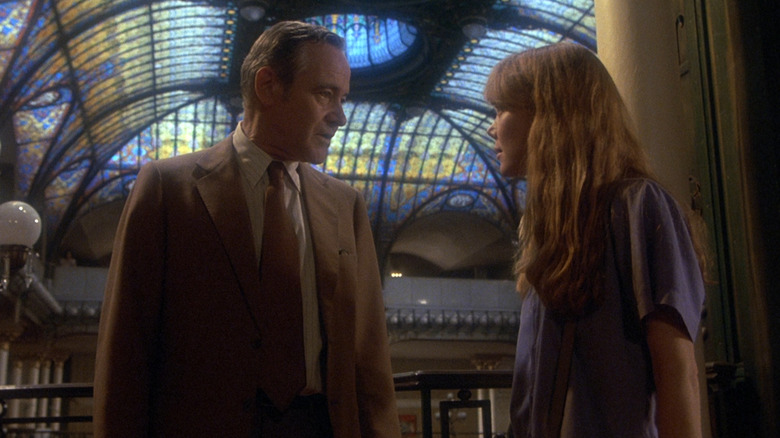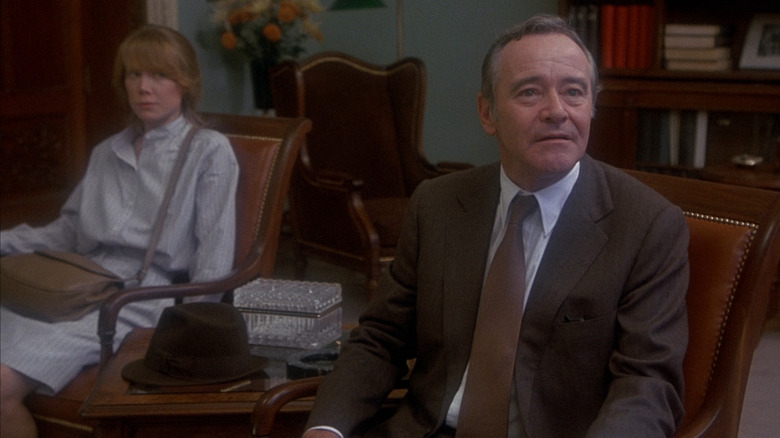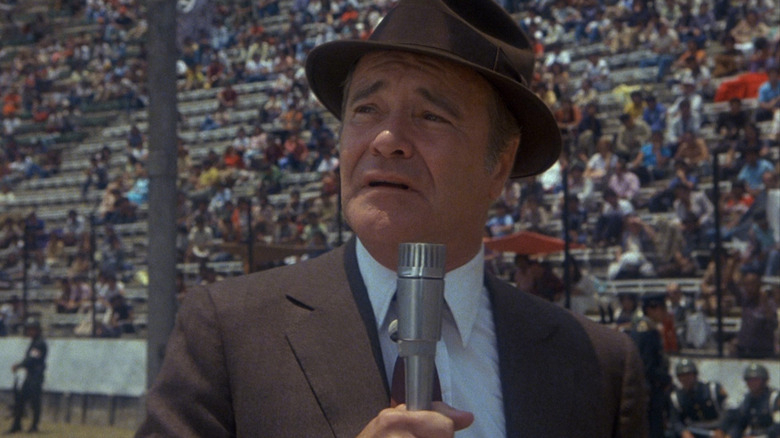The Best Picture Nominee You've Never Seen Because Of A Major Lawsuit
Streaming has contributed a great deal to the prevailing theory that everything you could possibly want is just a few clicks away. Think of a movie, and you can load it up on Netflix, HBO Max, Hulu, or any other streaming service to watch it. And if it isn't in any of those places, you could always go to Apple or Amazon to rent it. Unfortunately, this could not be further from the truth. The amount of films completely unavailable on a digital platform is incalculable. You would assume that the movies you can't see would most likely be small, independent films that never got proper distribution, but there are a ton of critically acclaimed, and even Oscar-nominated pictures with major movie stars that were distributed by Hollywood studios that you simply cannot find.
When I took a look back at the Best Picture nominees released in 1982, one of the five nominees was nowhere to be found digitally, the Costa-Gavras political corruption drama "Missing." I couldn't even find it illegally uploaded to YouTube, which occasionally happens with hard-to-find films. So, I took to physical media. In the United States, it has never been released on Blu-ray, and on DVD, it has been out of print for over a decade. This is a Best Picture nominee distributed by Universal Pictures that stars Jack Lemmon and Sissy Spacek, but if you want to watch it, you have to import a Blu-ray from the Powerhouse Indicator label in the United Kingdom.
"Missing" being incredibly difficult to find in the U.S. is nothing new, but it wasn't because of the usual problems with the rights to the film. No, "Missing" was tied up in a massive libel lawsuit that practically buried the film for two decades.
The cost of exposing government crimes
"Missing," tells the story of the search to find leftist journalist Charles Horman (John Shea), by his father (Jack Lemmon) and wife (Sissy Spacek), who was kidnapped and executed in Chile during the 1973 coup. The movie supposes the United States government not only knew about Horman's killing but perhaps even approved of it, as the coup itself was backed by the US. Naturally, the government does not want to be associated with such heinous acts, and one such person was the US Ambassador to Chile at the time, Nathaniel Davis. In retaliation, Davis filed a lawsuit that accused writer/director Costa-Gavras, Universal Pictures, and Thomas Hauser, who wrote the book "The Execution of Charles Horman: An American Sacrifice" that the film was based on, of libel.
Despite the fact that "Missing" changes Davis' name, he believed that this was defamatory to his character and not the truth of what happened. Ultimately, the lawsuits went nowhere, either being dismissed by the courts or just the statute of limitations running out. As a surprise to no one, this actually was the true story of what happened to Charles Horman, though it took until 2016 for a Chilean court to finally implicate the US in the murder.
Due to the lawsuit, Universal removed "Missing" from VHS circulation, as it could be seen as continuing to propagate the libel they were being sued for. It never returned. It would not be until the mid-2000s until "Missing" found its way to DVD, first from Universal and then the Criterion Collection. Both of those DVDs are now out of print, and if you want one, it'll have to be secondhand. It's unclear if the scarcity still connects to the lawsuits, but for the United States, "Missing" is an apt title.
Hard to build a legacy without availability
The cinematic canon is an interesting thing. In the last few years, there has been much debate over what the canon means, who it represents and whether it should be broken altogether. What rarely gets talked about regarding the canon is availability. For a movie to even have the chance to be widely embraced by the public, they would need to be able to see it first. In the case of "Missing" in the US, it has no shot to be a film that garners discussion because there's no opportunity to see it. Unless you have a region-free Blu-ray player or happen to stumble upon an old DVD copy online or at a used media store, this is a film you can't see.
So many films get shoved behind the wall of availability for a variety of reasons. Sometimes, the rights to a movie are tied up with some other company who won't let them go, like Elaine May's "The Heartbreak Kid." Sometimes, the studio just refuses to release it and basically doesn't want to acknowledge it exists, like Disney's "Song of the South." For Costa-Gavras' "Missing," the circumstances of its unavailability are unique, but other films from his career are similarly difficult to procure copies of. His most famous film, 1969's "Z," also has no in-print physical media option in the States, but you could at least rent it on Amazon or stream it on HBO Max or Criterion Channel, though those options are quite limited in the grand scope of things. "Missing" has received very little recognition over the last 40 years, but it isn't because the public decided to reject it. They haven't even really been able to see it. Time should be the judge, not unavailability.


